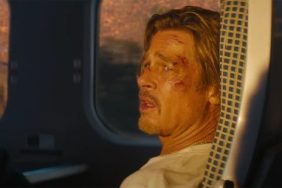I last spoke to actor Tim Roth over the phone, about his incredible performance in Ava DuVernay’s Oscar-winning Selma, but speaking to the man in person is a very different experience. You are struck by the physicality of Tim Roth, the way his gestures move along with his inflection. If you’ve ever seen his performance as “Pumpkin” in Quentin Tarantino’s Pulp Fiction, that’s a basically him, except for the armed robbery part. It’s surreal: thanks to Tarantino, you feel like you know him already.
Quentin Tarantino has written a new role specifically for Tim Roth, the character of Oswaldo Mobray in the western drama The Hateful Eight. The film, shot in gorgeous 70mm, features an ensemble cast of impressive actors (many of them Tarantino regulars) who are stuck together in the middle of a snowstorm. One or more of them are not who they seem, and hatred, violence, and eloquent monologues emerge naturally from the story.
It’s Tim Roth’s first film with Quentin Tarantino in 20 years, after the one-two-three punch of Reservoir Dogs, Pulp Fiction and Four Rooms. We spoke about the evolution of Roth as an actor and Tarantino as an actor, what it was like shooting Reservoir Dogs as opposed to The Hateful Eight, and why the cast of Tarantino’s first film was asked to perform Hamlet during their rehearsals.
The Hateful Eight arrives in theaters on Christmas Day.

The Weinstein Company
Crave: Was this one of those roles that Quentin Tarantino wrote specifically for you?
Tim Roth: Yeah.
What does that say, when you get this role and you read the part of Oswaldo? What’s your reaction?
Well, a lot of it I suppose would come from our previous discussions, of my healthy contempt for the upper classes over the history of my country. Or of anyone’s country really. He wrote to it. So I opened the script, I didn’t know what was going on. All I knew was the guy’s name. And [Tarantino] says something about… I have to get the exact quote but he said, “Oswaldo Mobray, a bit of a fop, not too much of a fop but a bit of a fop nonetheless.”
So I was like, “Oh, here it comes!” and then you get those delicious words.
“I think this is probably his best film, for my money, but my favorite of course is day one on Reservoir Dogs.”
I was watching this movie and it reminded me quite a bit of Reservoir Dogs. Did you ever talk about that?
Yeah, completely.
What did you say? What was the conversation?
The similarities of geography… well, not geography I suppose, but architecture.
It’s very confined.
It ends up being guys who are contained, and they have to deal with each other. And then the audience has to unravel what’s really going on. So it has a similar construct but it’s still, I think, far from that. He’s moved forward. Although Reservoir Dogs is my favorite of his films. I think this is probably his best film, for my money, but my favorite of course is day one on Reservoir Dogs.

Miramax Films
What was day one on Reservoir Dogs like? What was the first day?
What did we shoot…? I think we were shooting the diner. I think that’s where we were, yeah. We were out and about. We hadn’t got to the warehouse and yeah, it was tough. But it was not tough with him. It was like, he was brand new, he was fresh out of the box, but we already knew it was not his first time directing. He’d already made a ton of movies in his head, and he just got to make this. He got to make his first film.
Was it just his force of personality that got you on board?
No, the script. Just the script. I read it and I was reaching for the phone. I was twenty pages in and this was fucking unusual. This is not beginner’s work. This is somebody who was obviously incredibly well versed and can write beautifully, and intriguingly, and hilariously at times, for actors. So I wanted to meet him.
And funny enough I think he liked… he’d seen my work but he liked Rosencrantz and Guildenstern Are Dead, which is language. And he’s language. He’s one of the few people that writes speeches for actors. Not just this sort of concluding speech at the end of the film type of speech. You get stuff.
You get to talk for a while…
Yeah, but you’ve got to get it right. You have to get his music. You have to really play.
“[Tarantino]’s one of the few people that writes speeches for actors. Not just this sort of concluding speech at the end of the film type of speech. You get stuff.”
What’s the secret to getting Quentin Tarantino right, do you think?
I don’t know. First of all he’ll get you there, that’s a given. He’s a fantastic director of actors and his films have an incredible rhythm and structure and music in them, but I think you have to connect. I think it’s a hard slog when somebody doesn’t connect and understand the rhythms of his stuff. It’s a hard slog. It must be a hard slog for him, I’m sure it’s happened. I’ve been around it when it has occasionally happened. I guess you just have to connect to the music. […] t’s clear to me what he wants. It’s just completely clear. But then you’ll be running at speeches. You’ll be doing stuff and you’ll hit a brick wall.
Was it harder the first time because you also had to do an American accent?
Yeah, it was a challenge. I’d done one before but it’s a challenge because there’s like a wall in front of you. But after a week or so we were on a roll. But yeah, it kind of gets in the way but not with his stuff because you can just play. It’s such fun.

The Weinstein Company
In The Hateful Eight, the set that you’re in has so much detail. You have so much to work with. Tell me about that as an actor. What was in there that really helped you?
Oh everything. It’s an utterly three-dimensional piece of art and every drawer is full of stuff. Every corner, wherever you are. I don’t know, because this is the new kind of Quentin to me. After Pulp Fiction and Four Rooms I was done, and we almost got to be together on Inglourious Basterds but I couldn’t because of the TV show [Lie to Me].
But we all, all of us, there was a day when we all came to the set for the first time, we were just like, “What the fuck?” [Laughs.] And you just roamed around and explored it, and everything, the detail was extraordinary in it. Five months in we were still discovering stuff. So when he’s got a 70mm frame there, there’s never anything that is out of whack.
What sort of things do you discover after five months?
Just… “I never opened this drawer, what’s all this?” It’s like screws of all different kinds, nails and bobbins and needles and threads and stuff. You were just, “What was in there? Why did I never see that before?” I don’t know. If your character happened to open a drawer there’s stuff for you to play. That comes down to his team as well.
You talked about how you took a break from Tarantino’s films for a while…
[Laughs.] I didn’t take a break! That implies some kind of voluntary separation. It was never a voluntary separation for me. You just want to keep doing it. He’s one of those guys you would just want to keep working with, like Sam [Jackson] has. Sam’s [done] four? I’m four. So I’m kind of there. You just want to be in all of it.
Apologies. But my point is that you hadn’t been in his films for a while. How had he changed? Or how had you changed?
No, we both changed. I’d grown up a bit, but he… the biggest change, I mean, at the beginning he was a born filmmaker. A very good one by the way, so that’s good. Pulp Fiction? Better. Four Rooms? That was just a comedy thing that we did. We got that stoner movie. It’s a lot of fun.

Miramax Films
It’s a LOT of fun. I like that movie a lot.
My kids have just discovered it! “Dude, it’s so good.” [Laughs.] So there’s all that, then there’s a gap, right? We see each other. We bump into each other at festivals, we chat, we catch up, I was on juries with him, all that kind of stuff. So I don’t know, anyway, but I haven’t seen the progression of the actual set itself and how he constructs an environment. I’m not just talking about the set, I’m talking about the work environment.
So I came to this, and okay, now we’re on 70mm, which is extraordinary, but his team is like a well oiled machine. Every element of it is functioning brilliantly, and as is Quentin because he’s learned so much more. And as somebody who already had an incredible knowledge and an incredible skill with the stories he wanted to tell, and how to get them out, how to tell them, the mechanics of all of that, he knows so much more than he [knew then].
So that’s really what I saw. Just knowledge that he’d accrued, so much knowledge, [he] had more facility with his love, which is filmmaking. But the guy is kind of the same. I found that there’s a lot more going on in his head but he’s the same guy. He was always a good guy.
“You make so many of these shit movies in your career… You do! You make loads of them!”
You talked about how it wasn’t necessarily a voluntary separation all these years. I’m curious, and I know it’s a hypothetical, and I know I’m asking you to be selfish, but which roles would have been yours?
None of them! No, no, no, it’s not about that, it’s just that you want to be part of the gang.
Oh, I see. He’s the cool kid at school.
He’s fucking great! You know, you just go, “Oh, thank you.” As soon as you open [the script] you go, “Oh…” So much of the struggle, especially as you make so many of these shit movies in your career… You do! You make loads of them! I’ve made some good ones too… but a lot of your struggle is with dialogue, getting rid of a lot of it, extraneous stuff, and trying to shape it and save it. Sometimes it works and sometimes it doesn’t. But there’s an utter luxury of peeling open the first page of a Quentin script, because you know that element of it is done.
What other scripts or filmmakers have you had that experience with, of peeling open that page?
Tom Stoppard, you know?
Yeah, that makes sense.
Many! Pinter, Shakespeare…
You’re equating Quentin Tarantino to Pinter, Shakespeare and Tom Stoppard?
I would definitely equate him to Tom and Pinter, definitely. When we did the Reservoir Dogs rehearsal we did Hamlet. We pulled Hamlet out.

Cinecom Pictures
Who were you in that?
What did they do with me in that…?
Were you Rosencrantz or Guildenstern?
Oh no. See, that’s interesting! Are you going to talk to him today?
Unfortunately no.
Oh, poo. There was a particular… Oh, it’s the puppets! It’s the puppet king and all that stuff.
The Player King?
The Player King. So it was that, and for my character in that, it was because I was an English actor playing an American, playing a bank robber, who’s really a cop. So I had all of those layers. That’s why I loved that character. I had all of those layers to investigate, and that’s why we did it.
Do you have a favorite part that you’ve ever done?
That I’ve ever done?
Yeah.
Apart from these, you mean?
Sure.
Yeah, I mean the first one, Made in Britain, I think. That thing I did with Alan Clarke. Mike Leigh, that character I loved [from Meantime]. I loved playing Vincent [Van Gogh] with [Robert] Altman.
There’s a couple of things, two things I’m most proud of, one as an actor and one as a director. It was the only film I directed, I’m most proud of that, The War Zone. And then there’s a little film that hasn’t come out yet, and you’ll find a little [on] indie screens tucked away somewhere, called Chronic, which I did about a male nurse who’s a hospice nurse or something, with dying people. I’m pretty proud of that one as an actor, as a performer.
Top Photo: The Weinstein Company
William Bibbiani (everyone calls him ‘Bibbs’) is Crave’s film content editor and critic. You can hear him every week on The B-Movies Podcast and watch him on the weekly YouTube series Most Craved and What the Flick. Follow his rantings on Twitter at @WilliamBibbiani.








